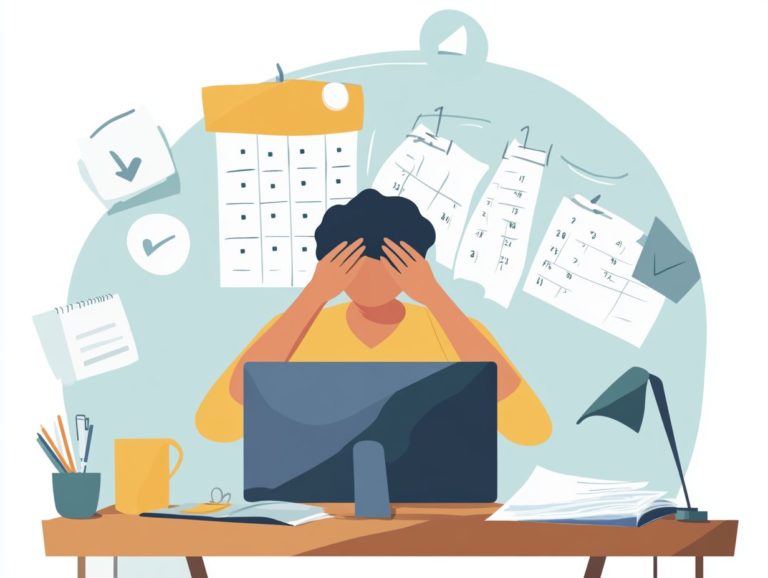What to Expect After Filing an Auto Insurance Claim
Navigating the aftermath of a car accident can feel utterly overwhelming, especially when handling auto insurance claims. Grasping what an auto insurance claim entails and the steps involved is essential for ensuring a smoother recovery process.
This article distills everything you need to know from gathering critical information immediately following an accident to filing your claim and understanding what to expect throughout the journey. With valuable tips and insights, you ll be well-equipped to tackle any challenges that arise, ensuring you receive the support you need to move forward confidently.
Contents
- Key Takeaways:
- Understanding Auto Insurance Claims
- Steps to Take After an Accident
- Filing an Auto Insurance Claim
- What to Expect During the Claims Process
- Possible Outcomes of an Auto Insurance Claim
- Tips for a Smooth Claims Process
- Frequently Asked Questions
- What can I expect after filing an auto insurance claim?
- How long does it take for an insurance company to process a claim?
- Will my insurance rates increase after filing a claim?
- What happens if my claim is denied?
- Can I still drive my car after filing a claim?
- What should I do if the other driver’s insurance company contacts me?
Key Takeaways:
- Understand what an auto insurance claim is and the steps to take after an accident.
- Know how to file a claim with your insurance company and what to expect during the process.
- Be aware of possible outcomes and follow tips for a smoother claims process.
Understanding Auto Insurance Claims
Understanding auto insurance claims is crucial for every driver, especially in a state like California where accidents can happen with alarming frequency. An auto insurance claim is your formal request to your insurance company, seeking compensation for any damages or injuries stemming from an accident.
This process involves several key players, including the police, adjusters, and insurance companies. They are integral to evaluating your claim and ensuring compliance with policies. Get to know the claims process and required documentation to navigate the intricacies of insurance policies, enabling yourself to meet your financial responsibilities with assurance.
What is an Auto Insurance Claim?
An auto insurance claim is essentially your formal request to the insurance company, asking them to cover costs related to an accident or damage to your vehicle. This process typically kicks off shortly after the incident occurs.
Gather all necessary information think photos, witness accounts, and police reports so you re fully prepared. Once you have everything in hand, submit a claim form to your insurer, detailing the events and associated costs.
Whether it s collision coverage for damage to your car, liability coverage for damages to another party, or comprehensive coverage for those pesky non-collision-related incidents, understanding these elements will help you navigate the claims process more efficiently. This knowledge can lead to a smoother resolution, making the whole experience a bit less daunting.
Steps to Take After an Accident
After an accident, it s essential to understand the steps you should take to ensure your safety and protect your interests:
- Assess for any injuries and call for medical assistance if necessary.
- Gather key information about the accident scene: collect the police report, document any damages, and obtain contact information from witnesses.
- Take photos of the accident scene and the vehicles involved these will be invaluable for your insurance claim.
- Exchange insurance details with the other driver, as this will streamline the claims process and provide your insurance company with the necessary information.
Gathering Information and Documenting the Accident
Gathering information and documenting the accident is essential for a successful insurance claim. It can significantly influence how your claim is processed.
To build a compelling case, meticulously collect various types of information. Create detailed accounts of the accident scene and gather comprehensive witness statements that encapsulate the perspectives of those who observed the incident.
Obtaining official police reports is crucial, as these documents provide an authoritative account of the events. Document any visible damage to vehicles and property through clear and focused photographic evidence.
By capturing images from different angles and close-ups of the damage, along with the surrounding area, your comprehensive visual documentation can greatly enhance the credibility of your claim.
Filing an Auto Insurance Claim
Filing an auto insurance claim is crucial after an accident. Don t delay, as every moment counts in getting your costs covered! It sets the wheels in motion for recovering costs related to damages and injuries.
Start by reaching out to your insurance company to report the incident and share all essential details. You’ll usually need to complete a claim form and submit relevant documentation, such as the police report and any evidence you’ve collected.
After that, a person who evaluates your claim will assess your case, evaluating the damages and determining what coverage applies under your auto policy. Keep in mind that this process can vary depending on your insurance company and the specifics surrounding your claim.
How to File a Claim with Your Insurance Company
Filing a claim with your insurance company is a structured process that demands your attention to detail and timely submission of information. Understanding each step will pave the way for a smooth experience.
Begin by reaching out to your insurance provider, which you can usually do through a quick phone call or their online portal. After you report the incident, a person who evaluates your claim will be assigned to your case.
Their job is to investigate the claim and assess its validity. Ensure you provide accurate details dates, times, and descriptions are all essential for the evaluator’s assessment.
With the evaluator s guidance, gather and submit all necessary documentation, such as photographs, receipts, and police reports, to effectively support your claim. Taking these steps will streamline the process and enhance your chances of a favorable outcome.
What to Expect During the Claims Process
Understanding the claims process can significantly ease the anxiety that typically follows an accident when you’re filing an insurance claim.
Once you submit your claim, an evaluator will reach out to you to examine the details and assess the damages. This entails reviewing repair estimates, determining who is at fault in the accident, and engaging with all relevant parties, including witnesses and other insurance companies.
Maintaining communication with your insurance company is crucial throughout this journey. This ensures that all necessary information is exchanged and facilitates a smoother, quicker resolution of your claim.
Timeline and Communication with Insurance Company
The timeline for your claims process might surprise you! It can vary significantly based on the complexity of the accident and how responsive everyone involved is.
You should prepare for the possibility that the entire process could take anywhere from a few weeks to several months, depending on the unique circumstances of your case. Maintaining regular communication with your insurance company is essential; it’s wise to check in frequently for updates on your claim.
Following up with your assigned evaluator via email or phone can help clarify any questions and give you a clearer picture of the timeline ahead. By being proactive in gathering the necessary documentation, you not only expedite the process but also foster a more effective dialogue among all parties involved.
Possible Outcomes of an Auto Insurance Claim
The outcomes of an auto insurance claim can vary greatly, influenced by the specifics of your accident and the terms of your insurance policy. Once your claim is assessed, you might receive a settlement offer from the insurance company to cover the damages and repairs to your vehicle.
This offer typically reflects the evaluator’s findings and may also encompass medical expenses if injuries are involved. If the claim doesn t reach a satisfactory resolution, it may require further negotiations or even legal action, depending on the circumstances and the willingness of all parties to cooperate.
Settlements, Repairs, and Other Resolutions
Settlements, repairs, and other resolutions are essential components of the outcome of your auto insurance claim. They shape how the costs associated with an accident will be managed.
Understanding these elements is crucial for you as a policyholder navigating the intricate claims process. When an accident occurs, your first step typically involves notifying the insurance company. An adjuster will then evaluate the damage. This professional plays a key role in assessing your claim by estimating repair costs and ensuring that all aspects of the incident are thoroughly considered.
If you re curious about how to evaluate repair costs, gather multiple quotes from certified mechanics to confirm that the proposed expenses align with industry standards.
Explore resolution options like direct repairs versus cash settlements. These can significantly influence how quickly and effectively your claim is resolved.
Tips for a Smooth Claims Process
Navigating the claims process effectively can greatly enhance your experience after an accident. Several strategies can make this journey smoother.
First, ensure you have all essential documentation ready. This includes photos of the accident scene, police reports, and contact information for witnesses.
Clear communication with your insurance company is crucial. Follow up regularly on your claim’s status and be proactive in addressing any questions from the adjuster.
Familiarize yourself with your policy’s coverage limits and deductible costs to help set realistic expectations throughout the claims process.
Preparing for and Dealing with Potential Challenges
Preparing for and addressing potential challenges during the claims process is vital for achieving a favorable outcome after an accident.
Navigating the intricate web of insurance claims can feel overwhelming. You might encounter various obstacles, such as disagreements with the adjuster over damages or delays in obtaining essential documentation. Stay proactive to ensure a smoother experience! Meticulously record all communications and seek clarity whenever issues arise.
To tackle hurdles like slow responses or conflicting assessments, establish a dedicated point of contact within the insurance company. This can pave the way for smoother dialogue. Regular follow-ups and requests for updates can help maintain a clear line of communication, ensuring that your claims process advances without unnecessary setbacks.
Frequently Asked Questions
What can I expect after filing an auto insurance claim?
Expect your insurance provider to investigate the claim, assess the damages, and determine coverage and liability. You may also be asked to provide additional documentation or information.
How long does it take for an insurance company to process a claim?
The time it takes for an insurance company to process a claim varies depending on the complexity of the claim and the company’s policies. It can take anywhere from a few days to a few weeks.
Will my insurance rates increase after filing a claim?
Your insurance rates may increase after filing a claim, especially if you are found at fault for the accident. However, each company has its own policies, so check with your provider for more information.
What happens if my claim is denied?
If your claim is denied, you can appeal the decision or seek legal assistance. Review your insurance policy to understand the reasons for the denial.
Can I still drive my car after filing a claim?
This depends on the extent of the damages to your vehicle. If it is not safe to drive, your insurance company may provide you with a rental car while your car is being repaired.
What should I do if the other driver’s insurance company contacts me?
If the other driver’s insurance company contacts you, be cautious. Do not provide statements or sign documents without consulting your own insurance company or a legal professional first.
Armed with this information, you re now ready to navigate your auto insurance claim with confidence!



